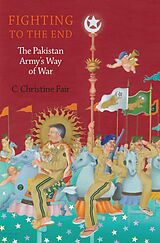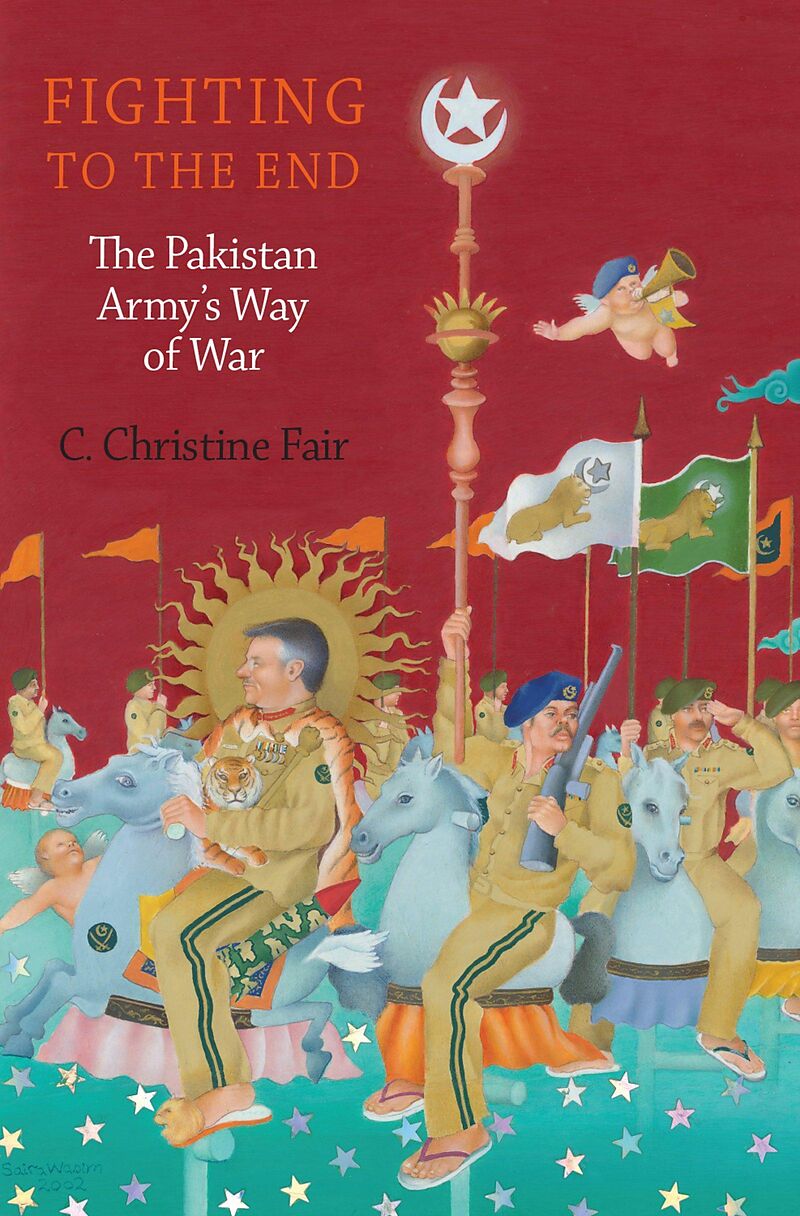Fighting to the End
Einband:
E-Book (pdf)
EAN:
9780199892716
Untertitel:
The Pakistan Army's Way of War
Genre:
Politikwissenschaft
Autor:
C. Christine Fair
Herausgeber:
Oxford University Press
Anzahl Seiten:
288
Erscheinungsdatum:
25.04.2014
ISBN:
978-0-19-989271-6
Since Pakistan was founded in 1947, its army has dominated the state. The military establishment has locked the country in an enduring rivalry with India, with the primary aim of wresting Kashmir from it. To that end, Pakistan initiated three wars over Kashmir-in 1947, 1965, and 1999-and failed to win any of them. Today, the army continues to prosecute this dangerous policy by employing non-state actors under the security of its ever-expanding nuclear umbrella. It has sustained a proxy war in Kashmir since 1989 using Islamist militants, as well as supporting non-Islamist insurgencies throughout India and a country-wide Islamist terror campaign that have brought the two countries to the brink of war on several occasions. In addition to these territorial revisionist goals, the Pakistani army has committed itself to resisting India's slow but inevitable rise on the global stage. Despite Pakistan's efforts to coerce India, it has achieved only modest successes at best. Even though India vivisected Pakistan in 1971, Pakistan continues to see itself as India's equal and demands the world do the same. The dangerous methods that the army uses to enforce this self-perception have brought international opprobrium upon Pakistan and its army. And in recent years, their erstwhile proxies have turned their guns on the Pakistani state itself. Why does the army persist in pursuing these revisionist policies that have come to imperil the very viability of the state itself, from which the army feeds? In Fighting to the End, C. Christine Fair argues that the answer lies, at least partially, in the strategic culture of the army. Through an unprecedented analysis of decades' worth of the army's own defense publications, she concludes that from the army's distorted view of history, it is victorious as long as it can resist India's purported drive for regional hegemony as well as the territorial status quo. Simply put, acquiescence means defeat. Fighting to the End convincingly shows that because the army is unlikely to abandon these preferences, Pakistan will remain a destabilizing force in world politics for the foreseeable future.
Autorentext
C. Christine Fair is an Assistant Professor in the Security Studies Program within Georgetown University's Edmund A. Walsh School of Foreign Service. She previously served as a senior political scientist with the RAND Corporation, a political officer with the United Nations Assistance Mission to Afghanistan in Kabul, and a senior research associate in the Center for Conflict Analysis and Prevention at the United States Institute of Peace.
Inhalt
Acknowledgments Chapter 1. Introduction The Argument: Explaining Pakistan's Persistent Revisionism In the Face of Repeated Defeats Organization of this Volume Chapter 2. Can Strategic Culture Explain the Pakistan Army's Persistent Revisionism? Pakistan's Enduring and Expanding Revisionism Explaining Persistent Revisionism Strategic Culture Wars Pakistan: An Army with a Country Reproducing Culture: Recruitment in the Pakistan Army Methods and Sources of this Study Chapter 3. Born an Insecure State Cracking the Raj Imagining Pakistan The Problem of the Princely States Untangling the Punjab Breaking Up the Indian Army Historical Legacies: A Punjabi Army Building a Modern Army Table 2.1: Corps and Locations Implications for the Pakistan Army's Strategic Culture Chapter 4. The Army's Defense of Pakistan's 'Ideological Frontiers' The Ideology of Pakistan The Army's Embrace of the Ideology of Pakistan The Army's Methods of Islamization The Army's Instrumentalization of Islam Implications Chapter 5. Pakistan's Quest for Strategic Depth British Management of the Frontier: The Great Game Pakistan's Army Seeks Strategic Depth: Managing Pakistan's Frontier and Beyond The Army Manages the Afghan Threat The Rise and Fall of the Taliban The Army's and the Internal Threat on the 'Frontier' Implications: Is the Past Prologue for Afghanistan and the Frontier? Chapter 6. India under the Pakistan Army's Gaze Multiple Crises and Four Wars India: Through the Eyes of the Pakistan Army Conclusions and Implications Chapter 7. Seeking Security through Alliances Pursuing the Americans: An Alliance for Survival The Pakistan Tilt Chasing China: The All-Weather Friend The Strains of War Pakistan's Relations with the United States and China through the Eyes of the Army Conclusions and Implications Chapter 8. Seeking Security under a Nuclear Umbrella Origins of Pakistan's Nuclear Program Proliferation Under the Eye of the State Nuclear Doctrine and Use Risk Taking Under an Expanding Nuclear Umbrella As Bad As it Gets? Table 8.1 Cross Tabulations of Conflict Months by Nuclear Status Table 8.2: Conflict Rate by Nuclear Period Conclusions and Implications Chapter 9. Jihad under the Nuclear Umbrella Origins of Pakistan's Use of Non-state Actors From Peoples' War to Low Intensity Conflict under a Nuclear Umbrella Pakistan's Militant Assets Pakistani Support for the Militants? The Internal Jihad: A Case Study of Lashkar-e-Taiba Conclusions and Implications Chapter 10. Is the Past Prologue Endogenous Game Changers Democratic Transition? Economic Shocks-For Better and for Worse Civil and Un-Civil Society: Impetus for Change? Change from Within the Army? Table 10.5. Punjabis versus Baloch in Balochistan Exogenous Sources of Change? Conclusions: Prospects for Change from Within and Without? Chapter 11. The Army's Strategic Culture and Implications for International Security Managing Pakistan's Persistent Revisionism? References Appendices: Maps

Leider konnten wir für diesen Artikel keine Preise ermitteln ...
billigbuch.ch sucht jetzt für Sie die besten Angebote ...
Die aktuellen Verkaufspreise von 6 Onlineshops werden in Realtime abgefragt.
Sie können das gewünschte Produkt anschliessend direkt beim Anbieter Ihrer Wahl bestellen.
Loading...
Die aktuellen Verkaufspreise von 6 Onlineshops werden in Realtime abgefragt.
Sie können das gewünschte Produkt anschliessend direkt beim Anbieter Ihrer Wahl bestellen.
| # | Onlineshop | Preis CHF | Versand CHF | Total CHF | ||
|---|---|---|---|---|---|---|
| 1 | Seller | 0.00 | 0.00 | 0.00 |
